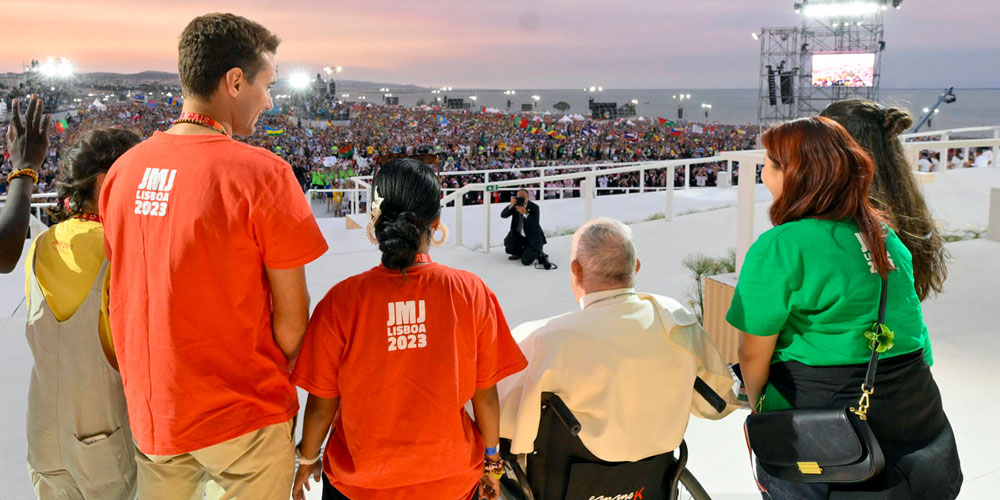Life is about walking onwards and if you fall you need help to get up. It means constant training because nothing in the world is free, except the love of Jesus.
This is the mandate that Pope Francis entrusted to the many young people, about one and a half million, who filled the huge Parque Tejo in Lisbon, and who to settle down with mats, sleeping bags, thermal blankets but also tents for the WYD Vigil from late morning, the penultimate act of a week of meetings on Portuguese soil. They arrived in the Campo da Graça after about 8-10 kilometres on foot, peacefully but joyfully invading the streets of the capital.
Before the Pope arrived in front of the large white stage that looks like a white ocean wave or a large sand dune, young people met, embraced, took pictures with the WYD Cross. The symbols of the WYD arrived, the Cross and the Icon of Our Lady Salus Populi Romani, around 6 pm, accompanied by several other decorated floats. The WYD anthem “Felizes”, by Jesuit Fr Miguel Pedro Melo, set to music by Miguel Tapadas, was a must. Air Force fighters pierced the sky the moment the Pope arrived on stage.
In the first part of the Vigil, a contemporary music and dance show told the story of a young woman who let herself be questioned by God and how this changed her life, infecting everyone she met. Inspired by the motto of this WYD, “Mary arose and went in haste” (Lk 1:39), a parallel was shown between what is represented and the story of Our Lady. Under the artistic direction of Matilde Trocado, the choreography represented the desire to continue praising God and serving others upon returning home. The meeting staged in the first part of the Vigil then became real and concrete in the second part, with the adoration of the Blessed Sacrament.
 The stage was lit beautifully, as a beacon for all pilgrims
The stage was lit beautifully, as a beacon for all pilgrims
Included in the show were two testimonials. Fr Antonio Ribeiro de Matos spoke of his commitment to bringing to others the “not fleeting” joy of finding Christ and being found by Him. Jesus was always present in his life, but even as he approached the Church, he always remained focused on himself. But a car accident after he momentarily fell asleep, and the fear of dying made him understand that the life he had lived up till then “was not worth it”. So he entered the seminary the following year, in 2019, and ultimately was ordained a priest. “In my fragility,” Fr Antonio explained, “I was able to recognise how much Jesus and the Church love me and accompany me and the desire to bring this experience to others grew.” Marta, on the other hand, is 18 years old and comes from Cabo Delgado, in the north of Mozambique, for five years the scene of barbaric armed and extremist groups. “Never, in the midst of so much suffering did we lose hope that one day we would rebuild our lives once more.”
Then came the Pope's address, which immediately becomes a dialogue with young people. The Pontiff explained the profound meaning of Mary's gesture, who “arose and went in haste” to go to her cousin despite having just received the angel's announcement. “Our Lady”, the Pope emphasised, "instead of thinking of herself, thinks of the other", of her cousin, because “joy is missionary”, it is not for oneself but to bring something to others. Francis reiterated this several times, asking young people to repeat it: we must bring joy to others, remembering that others have also prepared us to receive it. These are the people who have brought light into life: parents, grandparents, friends, priests, religious, catechists, animators, teachers and Pope Francis asked young people for a moment of silence to remember them. They are the “roots of joy”, because the joy that must be brought must not be temporary or momentary, but must “create roots”. And this does not happen in the enclosure of a library, but must be sought and discovered in dialogue with others.
The Pope also warned of fatigue: sometimes we “throw in the towel” and do not want to do anything and then we stop walking and fall. In life, however, failure is not the end. The important thing, he recalled, quoting a song by the Alps, is not to “remain fallen”, losing all hope. In that case, the only thing to do is to help those who fall to get up. These are words that that the Pope often repeated and was applauded as he asked young people to repeat them: the only way to look at a person from above is to help them get up.
To do all this, the Pope insisted, training is necessary, like the training that results in a goal at a football match. “There is no course that teaches us how to journey through life”, Pope Francis stressed, “we learn it from our parents, we learn it from our grandparents, we learn it from our friends, holding one another’s hands.” The Pope's invitation is to walk with a goal and to train for life day by day, because "nothing is free. We pay for everything.” “There is only one thing free,” the love of Jesus.
With this and with the desire to continue our journey, the invitation to young people is not to be afraid, to look at the roots without being afraid.

With thanks to ANS for this story

